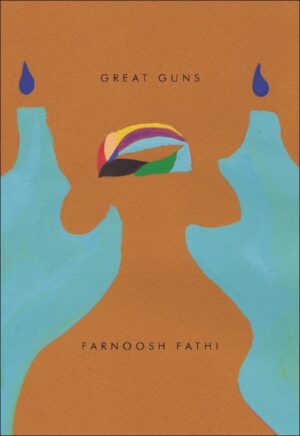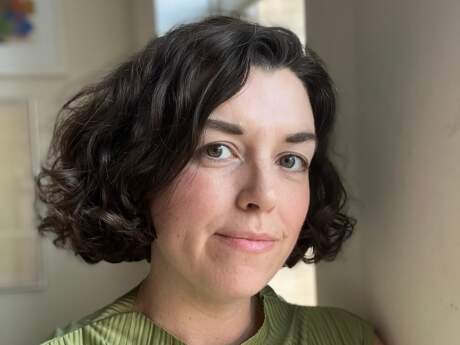In Their Own Words
Farnoosh Fathi's “News”

News
A coop of one demon that meant
no harm, rode me perfectly until the morning. Flip, cupid eyelid—
°
From the first, hot bell of June, he wiped his plate with the skin-
bag of a dove—the dove was full of chimes of mice . . . & the
mice were full clueless abysses which had their bones collapsed . . .
oh-collapsed until the dove's eyes popped & the plate grew very
white.
°
Was he sick? The rainbow arches
a bit of glitter and he coughs—a little fitting glory, purple
morns, beheadingly long.
°
Intact, there, like a face from which the plaster of a letter's
irrepressible envelope has been carefully peeled, even those
who did not know they loved her, knew when she left them:
their bodies were crippled but their faces were traveled and
glowing. All warred so poorly in her white noise, then with a
uniquely laxative look one said it a hundred pines can't cram this
eye but a human at an acre even gouges my peace of arc.
°
Today the slowest animal leaves the drawer, but letters will
fly back, école! For this he attends only to sing:
Worlds gone rabid!/ Gather and touch my/ lockjaw—now—/
because/ tomorrow I'll lift this ahh-purple/ ban & lay this
cripple at the waterfall.
°
And to the lightning foot, my foot quick to sympathize, they
chained a pine 20-foot long and gave me a shove toward the
1,000 clouds.
°
Upward and edward and edward and onward—barefoot (in
God's thin skin over a mountain, to meet his love), love's shoe a
small fluid skid of scorpions.
°
No matter how convinced I am by the image of myself in
weakness leaking from the stronghold of my own demonic
persuasion, there is simply a promise and that I must keep to
myself. How the substance of my smiles often dropped, bursting
the welt of each will, seven promenades below among broken
horses, asleep on this radical bunk, not a virgin tint to darken the
work of the idolator.
°
So homely that it seems in every effort of innocence I have
been (for all my faults my joys also retard me) grazing off the
soles of evil.
And they slap me, I tell them,
in many fluent directions, even the polite leaf, for my inmost
face of leaves is like
a plane in the empty-handed.
°
Reek rat ampled cheeks this is both running a fat bruise-coloring-
tome.
These meddlesome flashes! If only I could stand this/ parrot
in this/ pan.
°
What I intend, through the fat poised-out tongue and the cut-
outs of friends—
for any can pierce the height I win in walking—
to the right I bend a new timber arrow and yearn—inerts, rats
and all advisory hearts don't follow.
°
Honor of what I have been even if in one moment only, even if t
hat moment has been flattened by some present, overweight
nostalgia or some imaginative formation that my flying belonged
to then. Now that is yours, for spitting millions on the pageant the
street in which all words are one, as naturally the light lows
numbly, with millions, but particularly, with the footmen at
the rainbow: they double what you leave there, for they are
actually children, standing—one on top the other . . . axles
blowing, a full ground on their lips.
°
A tough skin flies off the stables. The tarmac grins, through
the spider's thong. Then how should one with no enemies be so
afraid? Miles part, she is polite, parting the backfire's hair through
an eidolon hairpiece on tour, to absorb more cud from this upstart burning. He says there is
another form of happiness, a ring around some dying head in
which his
horses run, before I see the grass and lose it;
until the overwhelming feast is just a tiny teaching broom.
From Great Guns (Canarium, 2013). All rights reserved. Reprinted with the permission of the author.
On "News"
The nuts that make up this poem were what I wrote on postcards to my friend the poet Genine Lentine. She was living at the San Francisco Zen Center, which has its sister temple, Tassajara, in Carmel Valley, CA, where I was going to live for the summer of 2010. Before I left, Genine, ever-prescient—Her Millions—had armed me with stacks of letterpress postcards she'd cut, and all of which she had stamped and addressed to herself; she knew that the schedule at Tassajara would leave me little free time to write, so her idea was for me to send a postcard a day (each of one or two short sentences) and for her to wait as these notes were passed, slow, over the weeks it took to leave the valley and reach San Francisco. Then she would post them right to the internet—as news from Tassajara (where there aren't cell phones, internet, computers). Mostly I wrote and dropped these nuts (the poem's, the sister's) on the fly in the mail closet, and out of my hands, forgot them promptly. So, it was surprising to meet them all together later, when I returned to San Francisco. Typing up the ones I liked, a sequence emerged, and then, excited by the dynamic of parts and whole, and of the relation of one nut to the next, I wanted to finish it, as one poem.
There was a clemency I felt all over when I wrote this poem in the parts that I didn't feel as much when I was finishing it, at a remove, later. Thanks to Genine: Her Millions is a clemency. And clemency is a sentry on any border and on this border of idiotic and genius, where genius is just the kid savage in me, and, turned inside out, knowing is the idiot practicing doggedly and secretly that secret that makes all things equal, all things matter, that evacuates all sense of laws and has no special hold but mystery. And I think the clemency I felt from Genine and others, and which I accepted and added to myself, made the poem more honest, and so, more mysterious, more knowing and idiotic and wild than I could have hoped or intended.



